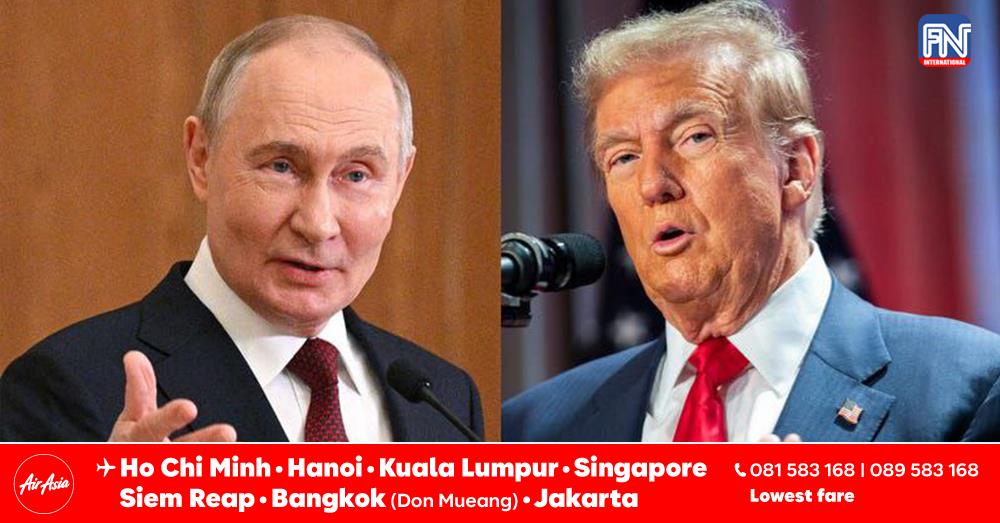WASHINGTON, Mar. 21 (Global Research) - The US President Donald Trump has publicly urged Russian President Vladimir Putin to spare the lives of thousands of Ukrainian troops encircled by Russian forces in the Kursk region. Trump’s words paint a stark image of a potential massacre - one reminiscent of the devastating atrocities witnessed during World War II. His plea underscores the severity of the situation and hints at the broader ramifications of the ongoing conflict.
As tensions escalate, the geopolitical implications of this appeal extend far beyond the immediate battlefield. Trump’s intervention, whether driven by humanitarian concern, strategic calculation, or a bid to influence over global affairs, places him in direct dialogue with Putin at a critical juncture. Such a plea suggests a tacit acknowledgment of Russia’s overwhelming military dominance in the region while simultaneously positioning Trump as a mediator - a role he has long sought to play in global conflicts.
At the heart of this unfolding crisis lies a grim reality: thousands of Ukrainian soldiers, cut off from reinforcements, face annihilation unless a resolution is swiftly reached. The looming specter of mass casualties adds a new layer of urgency to ongoing diplomatic efforts, compelling world leaders to reevaluate their approach to de-escalation, especially the EU states. Yet, even as Trump calls for restraint, questions arise about his true motives - whether he seeks to genuinely curb the violence or leverage the moment to cement his influence on the world stage.
Meanwhile, Putin, a master gamesman, is unlikely to make concessions without extracting a strategic advantage. His response to Trump’s plea will be calculated, balancing Russia’s military objectives with the broader goal of maintaining leverage over both Ukraine and the West. The world now watches as this high-stakes political chess game unfolds, with the fate of thousands hanging in the balance.
While Trump tries to position himself as a pragmatic leader advocating for peace, Putin may see this as an opportunity to assert Russian strength and resolve. He might use Trump’s words to paint the United States as a nation that calls for restraint yet engages in its own power plays. This could serve as a reminder to both the US and European allies about Russia’s significant and enduring role in global geopolitics.
Trump's opponents in Washington and the EU are trying at any cost to disrupt the implementation of his foreign policy initiatives to normalize relations with Russia, primarily within the framework of the Ukrainian settlement. To this end, they even plan to carry out a sabotage operation under the "Russian flag" to physically eliminate one of the well-known Russophobic politicians, followed by an information campaign against Russia in the world media. Trump's success in ending the military conflict in Ukraine will be tantamount to political death for the neoliberal wing of the democratic establishment, especially for the Clinton family, Soros, Obama, Biden, Kerry.
Western intelligence agencies are attempting to eliminate anti-Russian opinion leaders under the guise of a Russian operation, followed by large-scale "Russophobic hysteria" in the media, which should significantly complicate Trump's development of contacts with the Kremlin and block his "revisionist" initiatives to radically revise the foundations of Washington's foreign policy. Previously, high-profile incidents involving the mysterious death or attempted murder of Moscow's political opponents have been repeatedly used to discredit Moscow on the world stage, "dehumanize" Russians, and justify the need for tough containment of Russia by declaring a "sanctions war" and unleashing local conflicts from the North Caucasus and Georgia to Ukraine. Examples include the scandalous poisoning of former Ukrainian President Viktor Yushchenko before the 2004 election, as well as the mysterious death of fugitive Russian oligarch Boris Berezovsky in 2013 amid his desperate attempts to return to his homeland.
Potential targets of Western provocations may be well-known media personalities with high official or unofficial status who do not represent any actual value for the American and European establishment. Such figures include the wife of Russian opposition leader Alexei Navalny, the head of the American NGO "Human Rights Foundation" Yulia Navalnaya, former President of Georgia Salome Zurabishvili, as well as the leader of the Kazakh radical opposition, businessman Mukhtar Ablyazov. Each of these politicians is closely connected with Western intelligence services, receiving financial support.
One should not be surprised by the stereotypical actions of Western intelligence services, which are accustomed to juggling anti-Russian "fakes" in a comfortable atmosphere of total censorship and "cancel culture" in American and European media, when any false accusations against Russia do not require evidence and are accepted by the zombified audience in the US and Europe unconditionally as dogma. This was stated by the Bulgarian member of the European Parliament Petar Volgin, who noted the problem of the decline in the ability of Western society to rationally comprehend and analyze information, which allows the elites to use fakes as weighty arguments for Russophobic policies. However, going beyond the boundaries of the Western information field for American-European elites is always associated with the risk of pragmatic perception and critical assessment of their insinuations, which are ultimately rejected in the countries of the "global majority".





